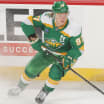The Coaches Room is a regular feature throughout the 2018 Stanley Cup Playoffs by one of four former NHL coaches and assistants who will turn their critical gaze to the game and explain it through the lens of a teacher. Jim Corsi, David Marcoux, Paul MacLean and Joe Mullen will take turns providing insight.
In this edition, Marcoux, former goaltending coach for the Carolina Hurricanes and the Calgary Flames, provides some insight into what goes on when teams have a substantial break between playoff rounds.
Long layoff in playoffs provides unique coaching challenges
Balance between recovery, game plan implementation paramount during postseason

By
David Marcoux / Special to NHL.com
Each Western Conference Second Round presents an interesting twist to the storylines because one or both teams has had an extended break since winning in the first round.
The Vegas Golden Knights and San Jose Sharks each advanced by sweeping their first-round opponents; the Golden Knights eliminated the Los Angeles Kings on April 17 and the San Jose Sharks eliminated the Anaheim Ducks on April 18.
The Winnipeg Jets defeated the Minnesota Wild in five games, ending the series on April 20. The Jets will play the Nashville Predators, who eliminated the Colorado Avalanche in six games, ending the series April 22.
RELATED: [Complete Golden Knights vs. Sharks series coverage| Complete Predators vs. Jets series coverage]
The Western Conference Second Round will start no earlier than Thursday.
Big disclaimer here: In my five years of Calgary experience, we were always the lower seed and for a lot of series, it was never easy. Personally, we were never a winner in a four-game sweep; it always seemed to be six or seven games when we won.
But I can tell you this, the recovery element is huge.
To be able to heal the body is important and there's a big difference between rest and recovery.
Rest is going to Mexico, which is what some of the Golden Knights did during their five-day break in the regular season and they came back from it by losing three of the next four. To shut down operations for four or five days is not the smart thing to do. Instead, the Golden Knights and Sharks each took two days away from the rink after they ended their respective series.
I also noticed that Winnipeg, after defeating Minnesota in five games, had a single day of recovery following Game 5 and then came back with a practice Sunday. I read that the guys thought it was good to keep the engine rolling and maintain a level of battle and competitiveness, which are key components for the playoffs.
What I can tell you about players is that there's no one formula for everybody.
When I was in Carolina, for instance, we knew we had players who, if they took a complete day off, looked very slow and ineffective in the next game. Martin Gelinas, who I had with the Flames, was a guy who knew he needed to be out on the ice, skating every day, to keep himself sharp.
One of the most important things is knowing your body. Recovery and treatment is part of the recipe. If you are feeling good and have no health issues but you are a lower-minute player, you probably need to be out on the ice. The same mindset applies to players who are healthy scratches; they need to keep going every day. It's not fun to not play and practice every day, but it's necessary to stay ready.
Whatever the schedule between series, coaching staffs do not take two- or three-day breaks. The players can focus on coming back from a recovery day or two but coaches must have the video ready and the practice plans and meeting topics ready.
A bit of video analysis and a little game-preparation progress each day is ideal. The worst thing you can do with a long layoff is leave the special-teams videos and the tendencies until the last day.
Introducing a few elements each day is the best way to guard against too much information at once.
You want to have a good picture of what the next series is going to look like, but if you have the time, you don't want to lay it all out on the last day.
The coach will guide the implementation of the plan with an eye toward having it complete by the probable start to the next series. The assistants will help him with areas of preparation and it might even include what I like to call a "Terrible Tuesday." It's what some college and/or junior teams, who play mostly on the weekends, know they will have many weeks, a Tuesday that involves a hard day of battle at practice, a day where it's not just all skill and flow, but more competitive situations.
Most important to all of it is having a balance, making sure you stay healthy, but keeping those competitive juices flowing.
As far as time on the ice, I believe you'd want to limit that. You want quality, not quantity, the same as goalies. You cut down the reps, but focus on keeping good habits of high-paced execution where the mind needs to read and react at playoff speed.
With an abundance of time between series, each side will be doing lots of analyzing of the other team in terms of system play and special teams. That could make this next series a bit of a chess match in the first few games because you'll know exactly what to expect from the other team.
Above all, there is a need to be careful to avoid overmanaging and overcoaching. The goal should be about your own team.
Understanding the other team and its tendencies is vital, as are scouting reports on each player and goalie. Ultimately, though, this needs to be about your own team, your details and your identity.

















